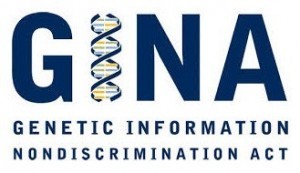
One of the newest moves at the federal level in employment law is the Genetic Information Non-discrimination Act of 2008, or simply known as GINA. This law is similar to other federal laws meant to prevent discrimination by an employer, but specifically focuses on an employer not discriminating against employees based on an employees’ genetic information. Many states, including Arizona, also have their own laws similar to GINA. This article is only a basic introduction to the topic. A competent Arizona employment attorney would be an invaluable resource in determining if you have been discriminated against by your employer based on your genetic information.
The Genetic Information Non-discrimination Act of 2008 (GINA) is a law to protect against discrimination in health insurance and employment. The focus on this article is on how GINA protects employees from discrimination by employers. Under GINA § 201(4) (A) (i-iii) genetic information, in general, includes genetic tests, genetic tests of family members, and the manifestation of a disease or disorder in family members of the individual. [note] Genetic Information Nondiscrimination Act of 2008, 122 Stat. 881 (2008).[/note] Also under § 201(4) (B) genetic information includes, “any request for, or receipt of, genetic services, or participation in clinical research which includes genetic services, by such individual or any family member of such individual.”
It is important to note that GINA is a federal statute that sets the absolute minimum in terms of protection against discrimination based on genetic information. Even if a state law does not protect an individual against discrimination based on genetic information, GINA exists to provide a minimum coverage. [note] Perry W. Payne, Jr., et al. Health Insurance and the Genetic Information Nondiscrimination Act of 2008: Implications for Public Health Policy and Practice. 124 Pub. Health Rep. 328, 330 (2009) (discussing the relationship between GINA and health care). [/note]
Other states have their own statutes similar to GINA. California’s GINA, also known as CalGina, offers more expansive protection than does GINA. CalGina creates GINA-like protections in many other areas, besides health insurance and employment. CalGina protects against genetic discrimination in housing, education, public accommodations, mortgage lending and elections. [note] Lisa Chung, Prohibiting Genetic Discrimination in Calif. (Oct. 6, 2011) http://www.law360.com/articles/274791/prohibiting-genetic-discrimination-in-calif [/note] This means, for example, that those who seek to sell their house, or entities such as banks, who lend money for the construction of a house, cannot discriminate on the basis of genetic information. This type of protection goes above and beyond GINA protection.
Arizona has their own law to protect against genetic discrimination by an employer, but it is by no means as expansive as CalGina. A.R.S. § 41-1463(B)(3) states that it shall be unlawful for an employer to “fail or refuse to hire, to discharge, or to otherwise discriminate against any individual based on the results of a genetic test received by the employer.” Thus in Arizona, a genetic information discrimination claim could be brought under Arizona law or federal law.
For employers and employees GINA means different things.
For employees, GINA should give individuals with genetic conditions confidence in their workplace. If an employer discovers. , that you or a family member have a disease that may negatively affect your job performance and instead of choosing you for the promotion chooses someone else, then there is a good chance that you may have a GINA claim.
Even acquiring genetic information for what may seem like a useful or beneficial purpose may be a GINA violation. This was seem in a 2015 lawsuit where a company was sued for violating GINA merely in an attempt to discover which employees were defecating in one of its warehouses, forcing it to destroy some of its merchandise. [note] Lowe v. Atlas Log. Grp. Retail, 102 F. Supp. 3d 1360 (N.D. Ga. 2015). [/note] The company here required employees to take a cheek swab test where the cheek cell samples were sent to a lab and were compared to the DNA in the fecal matter. This was found to be a violation of GINA. [note] Philip Miles. $2.25 Million GINA Verdict in the “Case of the Devious Defecator.” (June 25, 2015), https://www.lexisnexis.com/legalnewsroom/labor-employment/b/labor-employment-top-blogs/archive/2015/06/25/2-25-million-gina-verdict-in-the-quot-case-of-the-devious-defecator-quot.aspx?Redirected=true.[/note] This case showed that even an attempt to use genetic information to discover a perpetrator may be a GINA.
Genetic information, like race, gender, and such other characteristics, is inherent and individual to you. Your genetic information is personal and should not be used against you by your employer. If you feel you have not been hired, were fired, or have otherwise been treated unfairly by your employer based on your genetic information meeting with a Mesa employment attorney at Denton Peterson, PC will help you understand what options you have and what actions you may take.
Brad Denton – Denton Peterson, PC
1930 N Arboleda #200
Mesa, AZ 85213
Office: 480-325-9900
Email: brad@dentonpeterson.com
Website: dentonpeterson.com
Are you dealing with labor law violations regarding trade secrets? Consult with employment law experts…
Wondering how to protect trade secrets in litigation? Learn strategies for early identification, specificity, and…
Want to protect your business from liability and disputes? Learn effective contractual tools and legal…
Concerned about embezzlement in your business? Learn how to safeguard against theft, understand legal distinctions,…
How is remote work reshaping commercial real estate? Explore how businesses are adapting leasing strategies,…
Is your business ready for remote work? Learn the legal considerations & best practices for…